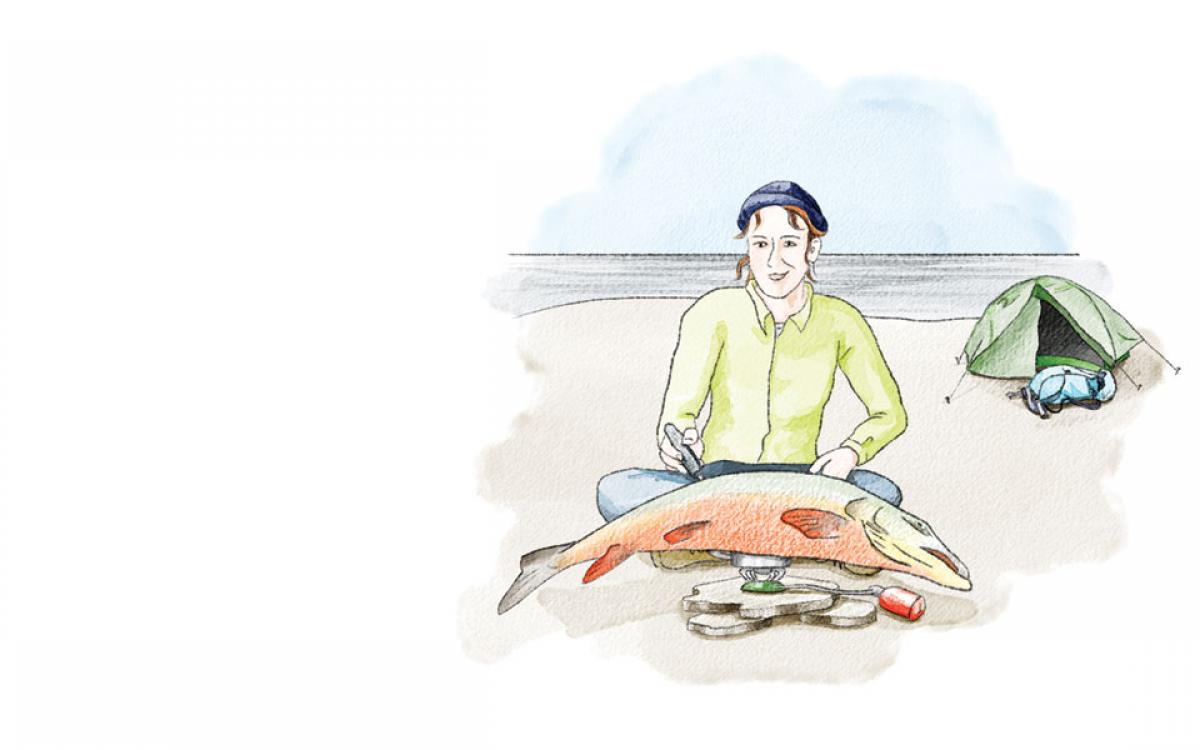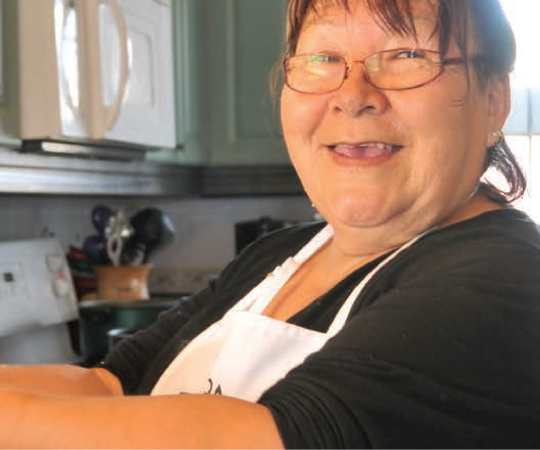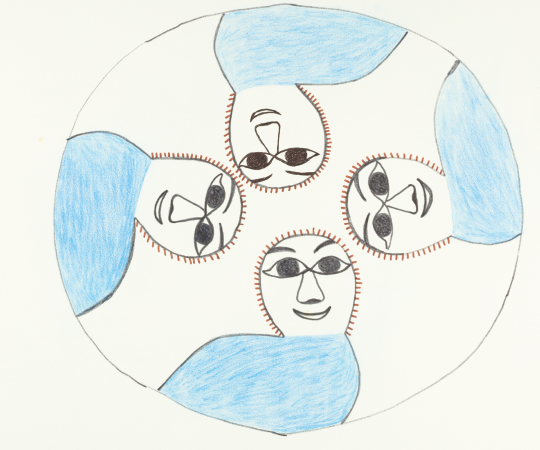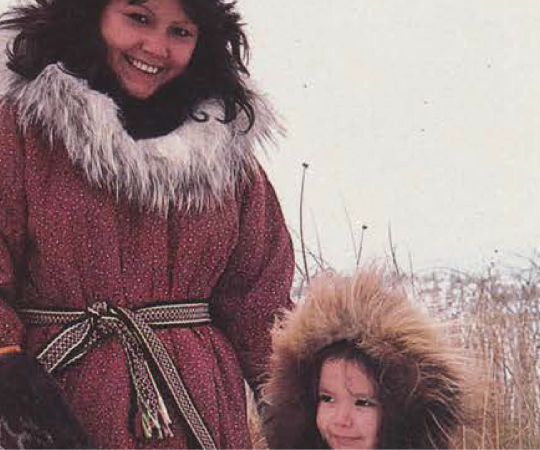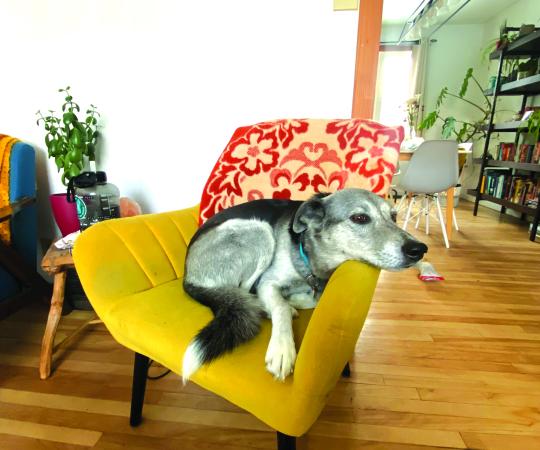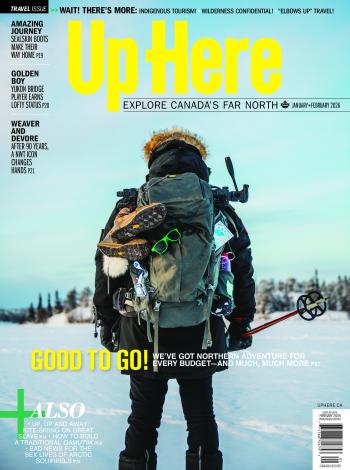The remnants of a long, dark winter in Iglulik dripped off the roof. It was time for an outdoor expedition.
Iglulik is located on an island nestled next to the Melville Peninsula, roughly 70 kilometres from Hall Beach, a neighbouring community to the south. In the past, I’d skied from Iqaluit to Kimmirut, and hiked the Pang Pass from Qikiqtarjuaq to Pangnirtung. Hall Beach, I thought, was the perfect destination for our late-spring trip. The hike, criss-crossing tundra marshes and raised beaches, would be the latest community in the Qikiqtaaluk region that I’d visit under my own steam. Plus, it would only take five of my and my partner Alex’s seven vacation days.
Based on previous trips, I knew three absolute truths about myself. The first: my backpack is always staggeringly heavy. The second: I end trips with an abundance of food. (I once baked a birthday cake with my leftovers.) Finally, even though I have the best of intentions, I never manage to get into the necessary shape to comfortably carry all of my stuff.
Things would be different this time around, I told myself. But since exercising to get into peak physical condition is too much work, I instead ordered a small library of books to research the myriad ways of decreasing the weight of my backpack. I would, in short, become a convert to the ultra-light lifestyle.
When the books arrived weeks later, out came my scissors and I literally cut weight. The first casualties were the extra straps on my bag. Next, I did away with my small daypack. Oh, the elation I felt as I became master and commander of my backpack. I also learned to do away with luxuries like toilet paper. Moss makes a soft substitute.
Now, it was time to tackle my true nemesis: the toiletries bag, which was often as heavy as a rock. A couple grams of baking soda replaced my deodorant stick and my tube of toothpaste. Who needed a handle on their toothbrush? Moisturizer and lip chap? For glampers. I didn’t stop there. Why burden yourself with a fork and a spoon when a spork can do the work of both? Why take a whole dish sponge when a one-by-one-inch square would do? But since we were going to be true ultra-lighters, we forgot the sponge and soap altogether. There would be water and sand aplenty en route.
Finally, I turned my attention to food. First, I had to create a dehydration device. I cobbled together a cardboard contraption with a duct tape exterior, a work light hanging inside and racks made of mason jars and chopsticks. This DIY approach was necessary—we were leaving in three weeks and it could be five weeks before a store-bought dehydrator arrived. Plus, there was the fun factor.
I strung apple rounds in the window box to dry in the Arctic sun. Red pepper hummus crumbled under the light. Tomato sauce dehydrated for a week in the oven. (I did my best to not think of the ultra-heavy power bill.)
All of this preparation created a mess. Friends no longer came over to visit—not because they weren’t welcome, but because they couldn’t fit in past the doorway. And they were probably beginning to question my sanity.
Inuit camp differently than non-Inuit. For Inuit, camping is an extension of a subsistence way of life and definitely not something that has you weighing out eight ounces of oatmeal on a kitchen scale at 11 at night. But I had some time off from work and something to prove to myself.
The big day finally arrived. Our friend Simon was going hunting on the mainland and he offered to give us a ride over in his boat. It was a beautiful, sunny Saturday afternoon. We helped Simon set up his nets and then consulted the map, while Siku—our loyal canine companion—ran around, euphoric.
Simon came back from his nets holding a shiny, fat Arctic char. “Take this on your trip, so you don’t go hungry,” he said. The fish stared at us with its blobby eyes. We stared back and I knew we wouldn’t turn down a fresh fish or the generosity of a friend. But here we were, at the start of our trip, and our ultra-light dreams had already come to naught.
We thanked Simon and hiked twenty kilometers with a ten-pound char, which we later cooked on our three-ounce camp stove.

